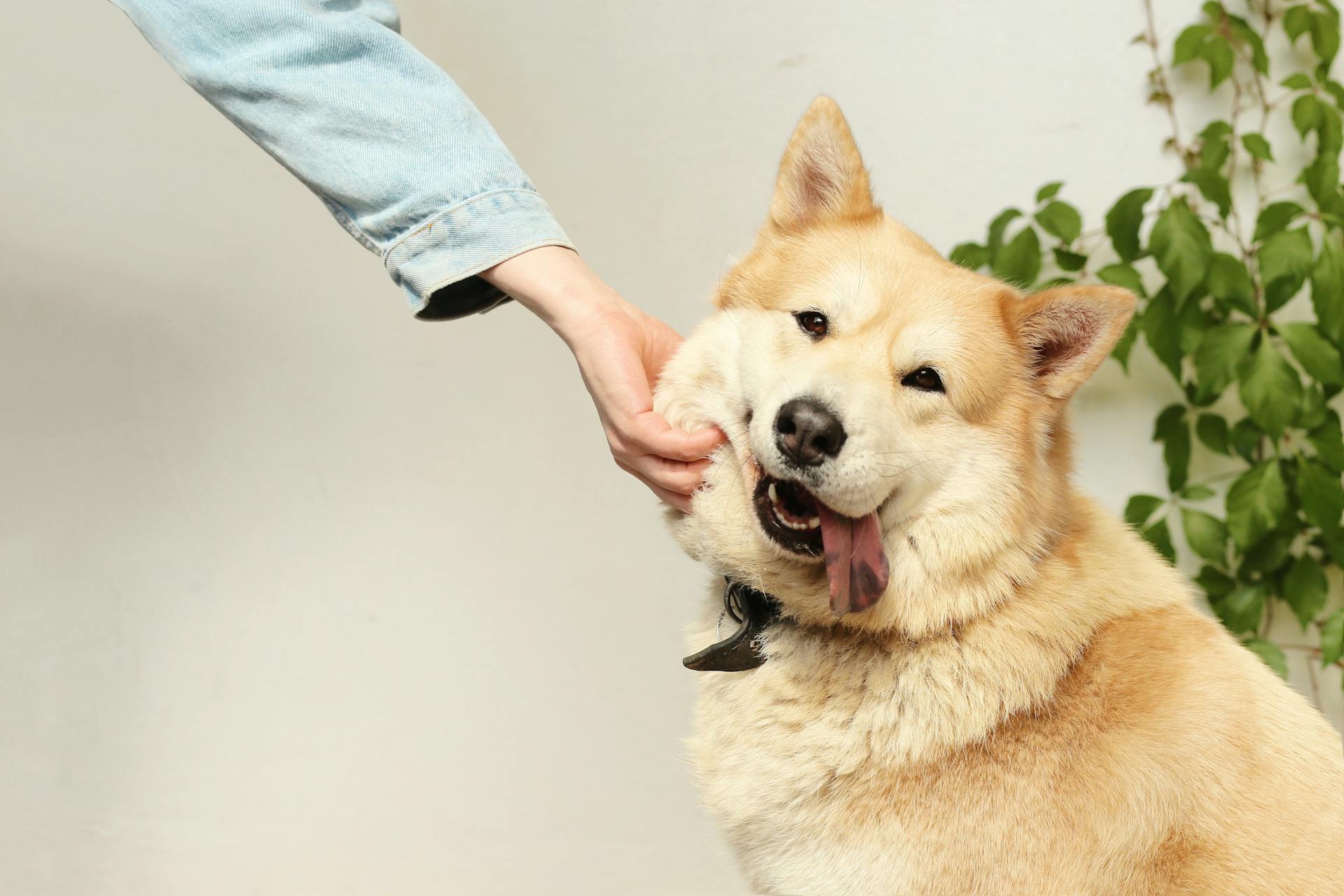
Sheepadoodles are a cross between a sheepdog and a poodle, and they inherit the best traits from both parents. On average, a Sheepadoodle's lifespan is between 12-15 years.
To ensure your Sheepadoodle lives a long and healthy life, regular exercise is crucial. Aim for at least 30 minutes of exercise per day, including walks, runs, and playtime in the yard.
A well-balanced diet is also essential for your Sheepadoodle's overall health. Feed your Sheepadoodle high-quality dog food that meets their nutritional needs, with a focus on protein-rich foods like chicken and fish.
Sheepadoodle Health
Sheepadoodles are generally a robust breed, but like any dog, they can be prone to certain health issues. Regular visits to the veterinarian, proper exercise, and a healthy diet can help stave off these problems as your pooch ages.
Some common health issues that Sheepadoodles may inherit from their parents include bloating, joint swelling and pain, Cushings or Addison's disease, and certain types of cancer. Inbreeding is a big concern when it comes to dog breeds and health, but fortunately, Sheepadoodles are not typically a concern due to inbreeding.
The combination of "hybrid vigor" and good breeding practices can result in a genetically healthy dog. However, it's essential to find a breeder who screens for genetic health issues and joint issues to ensure your pup will not have a genetically inheritable disease.
Sheepadoodles may inherit some tendencies from their parents, including hip dysplasia, elbow dysplasia, cataracts, and certain skin disorders. Hip dysplasia is an abnormal formation of the hip socket that can lead to arthritis of the joints, or crippling lameness in severe cases.
Here are some common health issues that Sheepadoodles may be prone to:
- Cataracts
- Von Willebrand’s disease
- Mitral valve dysplasia
- Entropian
- Ectropian
- Demodectic mange
- Diabetes
- Addison’s disease
- Sebaceous adenitis
- Bloat
- Hip dysplasia
It's essential to work with a reputable breeder who prioritizes health testing and genetic diversity to ensure you're getting a healthy pup. By doing your research and finding a responsible breeder, you can help ensure your Sheepadoodle lives a long and healthy life.
Sheepadoodle Care and Maintenance
Sheepadoodles are a low-shedding breed, but they still require regular grooming to prevent matting and tangling of their fur. A weekly brushing session is essential to keep their coat healthy and prevent knots.

Their exercise needs are moderate, with daily walks and playtime recommended. A 30-minute walk or play session per day is sufficient for most sheepadoodles.
To maintain their overall health, regular veterinary check-ups are crucial, especially during the first two years of their life. This will help identify any potential health issues early on.
Related reading: Sheepadoodle Health Issues
Exercise
Exercise is a crucial part of Sheepadoodle care and maintenance. This mixed breed requires daily exercise to maintain a healthy body and a happy mind.
To keep your Sheepadoodle happy and healthy, aim for at least an hour of walk time each day, weather permitting. This can be a great opportunity to spend quality time with your furry friend.
Time spent in a secured yard to play, run, and explore every day is also highly recommended. This allows your Sheepadoodle to expend energy and engage their natural instincts.
If the weather doesn't allow for outdoor exercise, don't worry – indoor activities like hide-and-seek, chase, and puzzle toys can be a great alternative. These activities can help keep your Sheepadoodle entertained and exercised.
Related reading: Life Expectancy for Great Pyrenees
Sheepadoodle Care
Sheepadoodles require regular grooming to prevent matting and tangling of their fur. They need to be brushed at least 2-3 times a week.
Their eyes are prone to tear staining, so it's essential to clean them regularly.
Sheepadoodles are generally healthy, but they can be prone to hip dysplasia, eye problems, and allergies. They can live up to 12-15 years with proper care.
Sheepadoodles need plenty of exercise to stay happy and healthy. A daily walk and playtime are a must.
They are highly intelligent and trainable, but they can be stubborn at times. Consistent training and positive reinforcement are key.
Sheepadoodles are social dogs and thrive on human interaction. They make great family pets, but they do require attention and interaction from their owners.
Poodle Cross Breeds
Poodle cross breeds, also known as doodles, tend to be quite healthy due to "hybrid vigor", a fancy term for the idea that mutts are generally healthier than purebred dogs.
This is because doodles inherit genetic diversity from their Poodle parent, which reduces the risk of inherited health issues. In fact, many doodle breeds were specifically created to improve the health of one or more parent breeds.
The Poodle itself is a relatively healthy breed, but like all breeds, it's not immune to genetic conditions. Some common issues in Poodles include progressive retinal atrophy and Von Willebrand's disease.
To ensure you're getting a healthy doodle, look for a breeder who screens for genetic health issues and joint problems in their parent dogs. This includes breed-specific genetic health testing and hip and elbow testing for larger breeds.
Here are some doodle breeds that are known for their good health:
- Mini Goldendoodles
- Standard Bernedoodles
- Mini Bernedoodles
- Standard Goldendoodles
These breeds are often a great choice for families or individuals who want a healthy and loving companion.
Frequently Asked Questions
What is the downside of sheepadoodles?
Sheepadoodles require regular social interaction and may develop anxiety or destructive behavior if left alone for extended periods. They thrive in homes with owners who can provide consistent companionship and attention.
Featured Images: pexels.com


